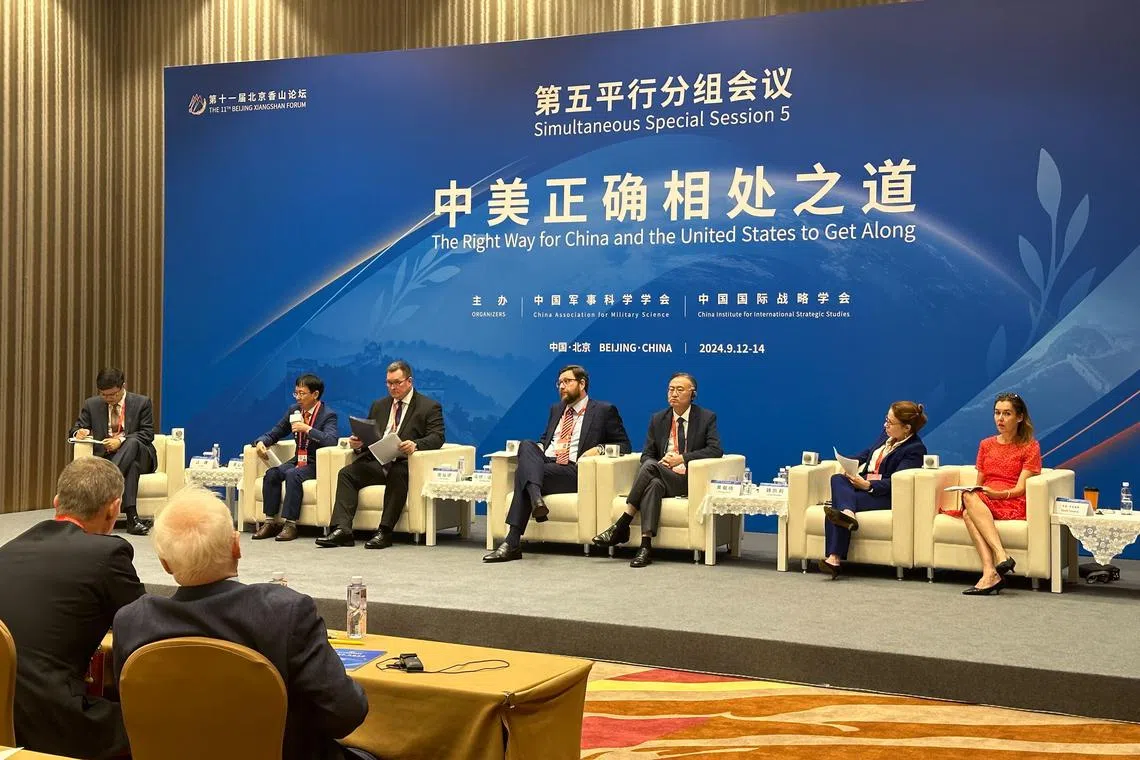Can the US and China get along? Experts at Xiangshan Forum suggest more bilateral talks
Sign up now: Get insights on Asia's fast-moving developments

A panel discussion on US-China relations at the 11th Xiangshan Forum in Beijing on Sept 13.
ST PHOTO: LIM MIN ZHANG
BEIJING - Creating a joint committee of scholars, former government officials and members of civil society from the US and China could be one way to rebuild trust between the two superpowers, whose ties have been strained in recent years.
This was a suggestion by Professor Wu Xinbo, an expert on US-China relations, during a panel discussion at the 11th Xiangshan Forum – a high-level security conference – in Beijing on Sept 13.
The committee could meet every few months, review what each side has done to reduce and contribute to the risk of conflict between the two countries, and make recommendations to each government, he said.
“This is tactical but very pragmatic given the current political situation in both countries,” said Prof Wu, who is the dean of the Institute for International Studies at Fudan University in Shanghai.
“We cannot just rely on the two governments to solve the problem. We need to mobilise the positive forces from the two societies to work on this common goal,” he told a packed room of academics, military officers and journalists.
The discussion titled, “The Right Way for China and the US to Get Along”, was among the most well-attended at the three-day Xiangshan Forum, a high-level international security forum similar to Singapore’s Shangri-La Dialogue.
The forum, which ends on Sept 14, has drawn more than 500 participants from official delegations in 2024, including defence ministers and military chiefs.
The US-China relationship is often described as the world’s most important bilateral relationship, given its significant impact on issues ranging from Taiwan to the Russia-Ukraine war and climate change.
Since the middle of 2023, high-level exchanges have taken place regularly
Other panellists who spoke at the Xiangshan discussion also raised similar suggestions for non-official dialogue.
Dr Sarah Tzinieris, a research fellow at the Department of War Studies at King’s College London in Britain, said engagement could be done through Track 2 dialogue, or backchannel diplomacy.
“The advantage of this approach is to be able to get the two sides behind closed doors to thrash out such tricky and difficult discussions,” she said, adding that this method was helpful during the Israeli-Palestinian conflict in the early 2000s.
Can both countries cooperate on issues of global concern, such as pandemics and climate change, without first achieving consensus over political issues?
Beijing has said that the US view of China as a competitor is not conducive to strengthening relations, arguing that it leads to policies that contain China’s development, such as export restrictions on semiconductor technology.
Prof Wu said both countries can still make “tactical” moves to strengthen cooperation, as long as both sides want to reduce the risk of conflicts.
Yet, tensions remain not far from the surface regarding what more China could do on global conflicts and China’s intentions for its military, which has modernised rapidly since the 1990s.
Professor Da Wei from Tsinghua University, the moderator, asked China foreign policy expert Carice Witte what the US and China could do together for the Palestinian issue.
Ms Witte, founder and executive director of the Signal Group, an Israel think-tank, said China could work with the US to rein in Iran.
“I think China’s understanding of the Middle East is very much informed by its competition with the US and by its interests in promoting its relations with the Global South,” she said.
“And therefore bringing about cooperation between the US and China in this conflict is in conflict with China’s interests. So, I don’t know if there is too much room for that.”
An audience member, who identified herself as a research fellow from the Chinese Academy of Military Sciences, a research institute under the Chinese military, asked why the US has stopped publishing online its latest versions of defence papers, which guide how US forces fight.
Mr Chad Sbragia, a research staff member at the Institute for Defence Analyses and former US deputy assistant secretary of defence for China, noted that China has not published its defence White Paper since 2019. It used to be released every two years.
He said it was important to have transparency, but noted the lack of transparency on the part of China’s military.
“As the Chinese say, the forbearance has limits – and the transparency has limits too,” he said.
Correction note: The story has been updated to correctly reflect the name of the Signal Group.


